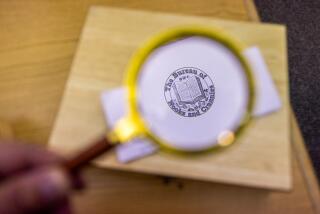Libraries to Expand Program for Porn-Free Web Sites
- Share via
Luanna Cisneros said she no longer worries that her 9-year-old daughter will be exposed to pornographic sites when she logs on to the Internet at the Pacoima Branch Library.
That’s because the girl is directed by the library staff to new, specially designated computers that automatically link up with child-friendly Web sites, keeping minors away from adult-oriented material.
“I feel very comfortable,” Cisneros said of the pilot program, which has been in operation most of this year at her library. “It’s important to have this because children may link on to something we don’t want them to see, by mistake.”
The program, which has even won the blessings of the American Civil Liberties Union, has been deemed so successful at seven branches that it will be expanded to all city libraries next month, officials said Monday.
The Kids’ Path program was designed as an alternative to more drastic proposals to install software on all library computers that would filter out adult Web sites.
“The pilot program was a very good success and because of that we have decided to roll out Kids’ Path through the entire library system,” said city librarian Susan Kent. “The kids liked it.”
The pilot program, at Pacoima, Woodland Hills, San Pedro, Cahuenga, Eagle Rock, Robertson and Mark Twain branches, was created in January after Councilman Rudy Svorinich Jr. and others voiced concerns that children tapping into the Internet using city library computers might inadvertently be exposed to adult-oriented material.
Svorinich proposed at the time that Kent consider installing filtering software on all the library system’s 600 public computers, but Kent and others said that could raise concerns about limiting adults’ access to constitutionally protected material.
As a compromise, Kent drafted the program that required at least three computers at each library to be set aside for the Kids’ Path program. Svorinich supported it.
The computers for kids are clearly marked. Librarians direct children 10 and younger to them.
The dedicated computers automatically default to the Kids’ Path page, which gives users a choice of child-oriented Web sites, including Jeeves for Kids and sites offered by Yahoo and America On Line.
But librarians do not prevent children from using computers with normal search engines. Elizabeth Schroeder of the American Civil Liberties Union of Southern California had objected to a blanket ban.
“We disagree with having kids only using filtered sites,” Schroeder said. “There is a lot of information that kids need to see that might be filtered out, such as information on AIDS.”
Schroeder said the Los Angeles program appears to be reasonable, although she added: “Preferably they would have no filtered computers.”
Schroeder noted that in 1998, a federal judge in Virginia ruled that forcing adults to use blocking software in libraries “offends the guarantee of free speech.” The ACLU recently threatened a lawsuit to get Kern County to modify a new policy that put blocking software on all library computers.
Los Angeles City Councilman Mike Feuer said he is pleased the city has been able to strike a balance between keeping children from being exposed to inappropriate sites and depriving library patrons of important information, including data on health issues.
“We have made real strides in protecting our kids, while at the same time making sure they have information they need to have,” Feuer said.
Parents have given the program good marks, said Diana Lisignoli-Cochran, head librarian at the Woodland Hills Branch Library.
“They like that we have taken the time to set aside sites for children,” she said.
Kent said she has received no complaints from parents, but some librarians have urged her to expand the offerings to minors to better reflect their needs when doing research and homework.
For that reason, the citywide program will offer minors links to additional information, including an encyclopedia and newspaper databases.
“It will be an expanded and improved program,” Kent said.
More to Read
Sign up for Essential California
The most important California stories and recommendations in your inbox every morning.
You may occasionally receive promotional content from the Los Angeles Times.










